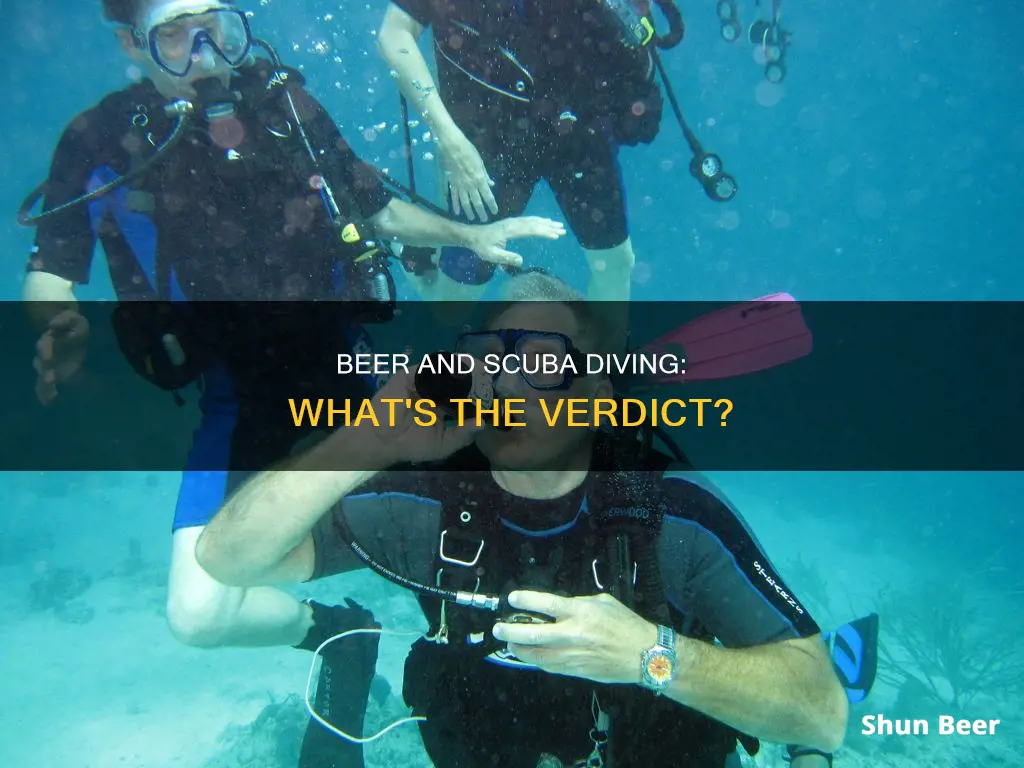
Drinking alcohol and scuba diving are two activities that should not be mixed. While it may seem harmless to have a beer the night before scuba diving, the effects of alcohol can still be present in the body the next day, impairing judgment and reaction times, and increasing the risk of accidents. Even a small amount of alcohol can have detrimental effects on the body when combined with the challenges of scuba diving.
| Characteristics | Values |
|---|---|
| Alcohol before scuba diving | It is recommended to leave at least 8-12 hours between your last drink and your first dive. |
| Alcohol and dehydration | Alcohol is a diuretic, which means you pee more, leading to dehydration. Dehydration is a risk factor for Decompression Sickness (DCS). |
| Alcohol and hypothermia | Alcohol dilates the blood vessels in your skin, causing you to lose heat. This makes you more susceptible to hypothermia, which is already a risk for divers. |
| Alcohol and hypoglycemia | Alcohol decreases glucose production in the liver, increasing the risk of hypoglycemia, or low blood sugar. |
| Alcohol and heart disease | Alcohol increases the risk of myocardial ischemia, a condition where blood flow to the heart is restricted. This can lead to a heart attack. |
| Alcohol and the central nervous system | Alcohol is a central nervous system depressant, impairing judgment and delaying reaction times. |
| Alcohol and the anterior cingulate cortex (ACC) | Alcohol deteriorates functioning in the ACC, the center in your brain that detects when you've made an error. |
| Alcohol and nitrogen narcosis | The effects of nitrogen and alcohol are cumulative, meaning one drink on the surface could have the same effect as multiple drinks depending on the depth of the dive. |
| Alcohol and decompression sickness | Alcohol can increase the risk of harmful nitrogen bubbles forming in the bloodstream, leading to decompression sickness. |
What You'll Learn

Drinking and diving don't mix
It's tempting to think that a drink or two the night before a scuba diving trip won't do any harm. After all, you'll be sober by the morning, right? Well, maybe not. Alcohol leaves your bloodstream slowly, and its effects can still be felt the next day. Even a small amount of alcohol can impair your judgment and delay your reaction times, which could be critical if you encounter an emergency situation while diving.
The Science
Alcohol affects the central nervous system, impairing judgment and delaying reaction times. It can also cause a fall in blood pressure and body temperature, making you more susceptible to hypothermia. Alcohol is also a diuretic, which leads to dehydration, a major cause of decompression sickness. Dehydration also slows nitrogen removal from your body, increasing the risk of decompression illness.
The Statistics
In a study published in the Journal of Studies on Alcohol and Drugs, experienced divers were given alcohol and then asked to perform simple dives. Those with a significant blood alcohol concentration (BAC) were unaware that their performance was impaired, despite it being clear to sober observers. The study found that divers' performance was significantly impaired with a BAC as low as 0.04%, which can be reached by drinking just two beers in an hour. Dr Glen Egstrom, a dive-physiology researcher at UCLA, reviewed over 150 studies and found alcohol to be involved in around 50% of diving accidents involving people of drinking age.
The Risks
The ocean might be alluring, but it can also be unpredictable and dangerous. Diving can be physically and mentally demanding, and small problems can quickly escalate if you're not at your best. You might need to swim against a strong current, or complete a long surface swim in rough water. You might need to react quickly and effectively in an emergency. Alcohol impairs your ability to do all these things safely.
The Bottom Line
The potential consequences of drinking and diving are serious, and it's simply not worth the risk. It's best to avoid drinking to excess while on a scuba vacation, or within 8-12 hours of going diving. If you do drink, make sure to hydrate as much as possible before getting in the water, even if you feel fine. If you don't feel 100%, it's best to postpone your dive until the next day.
Vaccine and Beer: What's Safe to Drink?
You may want to see also

Alcohol can cause dehydration, a risk factor for DCI
Alcohol is a diuretic, which means you will urinate more, leading to dehydration. Dehydration can cause fatigue and decrease the amount of blood available for gas exchange, and may slow down nitrogen removal from your body. This puts you at an increased risk of decompression illness, also known as DCI or the bends. Dehydration is one of the main factors for DCI.
Drinking alcohol can also affect how your body eliminates absorbed nitrogen from a dive, which can also lead to DCI. Alcohol dehydrates the body and lowers the volume of blood in circulation. This causes the heart rate to increase while pumping blood. The blood is saturated with nitrogen from the dive, and because it is pumping at a faster rate, it can increase the risk of nitrogen forming tiny bubbles.
It is recommended that you leave at least 12 hours between your last drink and your first dive. This is because alcohol leaves your bloodstream slowly, and the effects may still be present the following day. Even if you don't feel hungover, you may still be dehydrated. So, it is important to drink plenty of water if you plan to drink alcohol and scuba dive.
The effects of alcohol are made worse by the presence of nitrogen at depth. Nitrogen, like alcohol, is a sedative, so the effects of nitrogen and alcohol are cumulative. This means that one drink on the surface could have the same effect as two, three, or four drinks depending on the depth of your dive.
Therefore, it is important to avoid drinking alcohol if you plan to scuba dive, as the risks of dehydration and DCI are serious and not worth the small pleasure of drinking.
Diabetics and Rolling Rock Beer: Is It Safe?
You may want to see also

Alcohol can lead to hypothermia
Drinking alcohol before scuba diving is not recommended due to the increased risks it poses to the diver. Even a single drink can negatively impact your mental capacity and physical performance, increasing the likelihood of accidents and injuries. One of the dangers associated with drinking and diving is hypothermia.
When diving, the human body loses heat much faster than on dry land, and maintaining a warm body temperature is crucial for a safe dive. Alcohol can give you the false sensation of warmth while depleting your body's heat reserves. As a peripheral vasodilator, alcohol causes blood vessels in the skin to dilate, leading to increased blood flow to the skin's surface and a warm, flushed feeling. However, this diverts blood away from the body's core, making you more susceptible to hypothermia.
Additionally, alcohol suppresses shivering, which is a vital warning sign of significant heat loss. Without this natural defence mechanism, you may not realise that your body temperature is dropping to dangerous levels. This effect is further compounded by nitrogen narcosis, which also delays the body's shiver response. As a result, consuming alcohol before a dive can increase your risk of hypothermia and make it more challenging to rewarm your body after diving.
To avoid the dangers of hypothermia, it is recommended to refrain from drinking alcohol before scuba diving. Divers should also be cautious about drinking after diving, as it can impede the body's ability to rewarm itself. Staying properly hydrated and allowing sufficient time for alcohol to leave your system before diving are crucial for reducing the risk of hypothermia and other diving-related complications.
Beer and Prednisone: What's the Verdict?
You may want to see also

Alcohol affects your central nervous system
Alcohol is a central nervous system depressant. This means that it impairs your judgment and slows your reaction time. Even a small amount of alcohol can have a significant impact on your ability to react and respond to situations underwater.
A study published in the Journal of Studies on Alcohol and Drugs found that experienced divers who had been drinking were unaware of the increased risk of injury they were exposing themselves to. Despite this, their performance was clearly impaired, and they were deemed to be conducting unsafe dives. The study also found that divers' performances were significantly impaired with a blood alcohol concentration (BAC) as low as 40 mg/dl (0.04 percent). This is roughly equivalent to two 12-ounce beers consumed within an hour by an adult male with an average build on an empty stomach.
Dr Glen Egstrom, a dive-physiology researcher at UCLA, reviewed over 150 studies exploring the effects of alcohol on performance and found that alcohol was a factor in around 50% of diving accidents involving people of drinking age.
The effects of alcohol are compounded when diving due to the effects of nitrogen at depth. Nitrogen, like alcohol, is a sedative, so its effects are similar to those of alcohol. This means that one drink on the surface could have the same effect as two, three, or four drinks depending on the depth of your dive.
Alcohol also increases your risk of hypothermia. It causes the blood vessels in your skin to expand, leading to increased blood flow to the skin and away from your body's core. This makes it harder to detect hypothermia in its early stages as it also suppresses shivering.
Alcohol consumption also affects blood pressure. The blood vessels that supply the muscles constrict in response to heightened blood alcohol levels, which is particularly dangerous for divers already at risk of heart disease.
Overall, alcohol can have a significant impact on your central nervous system, impairing your judgment, slowing your reaction time, and reducing your coordination. These effects can be extremely dangerous when scuba diving, even if you are not aware of them, and can increase your risk of injury or accident.
Beer and Pneumonia: A Risky Mix?
You may want to see also

Alcohol can increase the risk of heart disease
There is no clear consensus on whether it is safe to drink a beer the night before scuba diving. While some people claim that drinking a moderate amount of alcohol the night before scuba diving is fine as long as you are sober and well-hydrated the next day, others advise against drinking any amount of alcohol within 8 to 12 hours before diving. This is because alcohol can cause dehydration, impair your judgment, reaction time, and coordination, increasing the risk of accidents.
Now, onto the topic of alcohol and heart disease:
Excessive alcohol consumption is linked to a higher risk of heart disease, including conditions such as high blood pressure, heart failure, stroke, and cardiomyopathy. Alcohol can lead to obesity and contribute to long-term weight gain, which are also risk factors for heart disease. Additionally, alcohol can cause mitochondrial dysfunction, changes in circulation, inflammatory response, oxidative stress, and programmed cell death, all of which can negatively impact heart health.
However, some studies suggest that low-to-moderate alcohol consumption may have cardioprotective effects. For example, moderate drinking is associated with slightly higher levels of "good" HDL cholesterol and a reduced risk of dying from heart disease. Nevertheless, the positive effects of moderate drinking should be weighed against the serious negative consequences of excessive drinking.
To reduce the risk of heart disease, it is generally recommended to stick to moderate levels of alcohol consumption, which is defined as one drink per day for women and one to two drinks per day for men. However, it is important to note that even moderate drinking may not be beneficial for everyone, and some individuals with certain heart conditions may need to avoid alcohol completely.
Beer, Anxiety, and You: A Curious Concoction
You may want to see also
Frequently asked questions
It is not recommended to drink alcohol within 8-12 hours before scuba diving. Alcohol can stay in your bloodstream for up to eight hours and its effects may still be present the next day, impairing your judgment and delaying reaction times.
Alcohol impairs your judgment and delays reaction times, which can be dangerous when scuba diving. It also increases your risk of hypothermia and decompression sickness.
If you are still feeling the effects of drinking, such as having a measurable BAC, feeling dehydrated, sick or having a hangover, then you should not scuba dive.
If you want to drink alcohol and scuba dive, it is recommended to leave at least 12 hours between your last drink and your first dive. Make sure to drink plenty of water and eat a good dinner before drinking to slow the flow of alcohol into your system.







